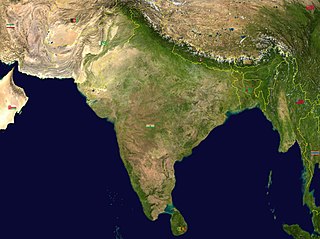Anu is a Mesopotamian god.
Contents
Anu or ANU may also refer to:
Anu is a Mesopotamian god.
Anu or ANU may also refer to:
Don, don or DON and variants may refer to:
Tara may refer to:
Uma or UMA may refer to:
Nandini is a South Asian female given name. It is derived from the Sanskrit verbal root nand, which means "to rejoice, delight". Literally, nandinī means a woman who brings joy. The name also specifically refers to a daughter, as a daughter brings joy to the family. In the Hindu religion, Goddess Parvati is often addressed by this name. Nandini also refers to one of the eight eternal companions (Ashtanayika) of Goddess Parvati.

The Republic of India has two principal official short names, each of which is historically significant, India and Bhārat. A third name, Hindūstān, is also used commonly when Indians speak among themselves. The usage of "Bhārat", "Hindūstān", or "India" depends on the context and language of conversation.

Anu – Museum of the Jewish People, formerly the Nahum Goldmann Museum of the Jewish Diaspora, is located in Tel Aviv, Israel, at the center of the Tel Aviv University campus in Ramat Aviv. The Hebrew Anuאנו means 'we, us'.
Sharma is a Hindu Brahmin surname. The Sanskrit stem ṣárman- can mean 'joyfulness', 'comfort', 'happiness'. Sarma and Sarmah are alternative English spellings of the name, commonly used by Assamese Brahmins.
Devi is the Sanskrit word for goddess.
Satya is a Sanskrit Concept in Indian religions that loosely translates into English as "Truth".
Amara may refer to:
Tara is a given name with multiple meanings in different cultures.
Chaudhary is a common surname in the Indian subcontinent and Pakistan, originally derived from an Indian hereditary title. "Chaudhary" is a term adapted from the Sanskrit word caturdhara, literally "holder of four". 'Chaudhary' was first bestowed by the various rulers of the Delhi Sultanate, and the custom was continued by the breakaway Bengal Sultanate. Later, the Mughals and the Nawabs conferred the same title in great numbers. Chaudharies were "local magnates" responsible for land taxes alongside an amil and a karkun (accountant) in the local-level administrative units known as parganas.
Uke or UKE may refer to:
Parvati is a Hindu/Sanskrit Indian feminine given name, which comes from the name of the goddess Parvati. Alternative spellings include Parvathy and Parvathi.
Aravind is a common Indian masculine name meaning lotus. The name is of Hindu origin. Its variants include Arvind, Aravinda, Aravindan, and Aurobindo (Bengali: অরবিন্দ).
Amita is a female given name of Indian, Hebrew and Italian origin. The name means "infinite, boundless" in Sanskrit, and "truth" in Hebrew.
Annapurna is a massif in the Himalayas, in north-central Nepal.

Maya is a female name in various languages with various meanings. In Sanskrit, for instance, Māyā means "illusion or magic", and is also an alternate name of the Hindu goddess Lakshmi. In the Tupi language, of southern Brazil, it means "mother", while Mayara means "grandmother". In the Māori language, the name means "courage" or "bravery", and is popular for Māori girls in New Zealand. The name may be a variant form of the Greek theonym Maia, the eldest of the Pleiades and the mother of Hermes in Greek and Roman mythology.
Akira may refer to:
Anu is a given name and surname found independently in several cultures. The Indian name is a short form of Anuradha, Anurag, Anubhooti, etc. The Finnish and Estonian name is derived from the Karelian variant of the name Anna, which became popular after Kersti Bergroth's play Anu ja Mikko of 1932. The Nigerian name which means 'Mercy', is a short form of Anuoluwa, Anuoluwapo, etc from the Western Yoruba tribe.